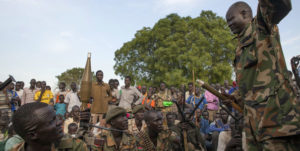
The White Army, a South Sudanese anti-government militia. Now the rebel group, led by Dr Riek Machar, supports the continued stay of Ugandan soldiers in the country. FILE PHOTO | AFP
By BARBARA AMONG | The East African
The conflict in South Sudan saw significant developments last week with Dr Riek Machar’s rebels finally coming to terms with the UPDF presence in Juba and the rebel leader travelling to Beijing, where he was expected to commit further to a peaceful settlement of the nearly one-year-old conflict.
While opening their liaison office in Kampala, rebel representatives declared support for the continued stay of Ugandan soldiers in Juba while Uganda on the other hand officially welcomed the Principal Representative of the rebels to Kampala.
The official opening of a liaison office in Kampala, players say, now gives Uganda leverage over the rebels and it is also seen as a sign of improving relations between the rebel movement and the government of Uganda.
READ: Museveni seeks Machar meet over exit strategy
Machar’s Principal Representative to Kampala David Otim said the liaison office in Kampala will be used to promote the diplomatic relations between the rebel group and Kampala, and to co-ordinate the humanitarian, peace and reconciliation initiatives in Uganda with the aim of realising permanent solution to the war in South Sudan.
Consensus on UPDF’s role
“We in the SPLM/A (in opposition) are in the meantime in consensus that the UPDF in South Sudan should continue to play their positive role in protecting lives and property as we wait for full deployment of Igad’s protection force as per the Addis-Ababa Cessation of Hostility Protocol,” said Mr Otim.
This is a U-turn from the previous demand that Uganda should withdraw its troops from South Sudan as a prerequisite for the Addis Ababa peace negotiation and for a meeting between President Yoweri Museveni and Dr Machar to take place.
READ: Machar rebuffs Museveni’s overtures
The change of heart on the side of Machar’s team follows a meeting in Kampala last month between Uganda’s security officials and Machar’s team.
The developments in Kampala come at a time when China, one of the major oil players in South Sudan, has summoned Dr Machar to Beijing to discuss the crisis.
Sources said China hopes to rein in Machar to commit to the peace talks and get a guarantee from him on protection of its interest in the oil fields. Dr Machar’s forces control the oil rich states of Unity and Upper Nile.
READ: China presses South Sudan over renewed violence
An advance team, led by Dr Dhieu Mathok Diing, arrived in Beijing last week. In the delegation is Comrade Hussein Mar Nyuot, chairperson for the humanitarian committee and Dr Richard K Mulla, the chairperson for the justice and human rights committee.
“Dr Machar will hold bilateral talks with officials of the Peoples Republic of China and try to forge mutual understanding,” said Machar’s spokesperson James Gatdet.
Prof Nathaneil Oyet, chairman for the rebel faction’s national committee for political mobilisation, toldThe EastAfrican in an interview that Dr Machar would discuss China’s role in the peace process and the recent report that China was supplying arms to the Juba government.
“We want to hold frank discussions on, for example, the question of human rights violations by government,” said Prof Oyet.
However, China’s worry, insiders say, is threats to its interests in South Sudan. The war, which broke out December last year, has affected oil production, reducing it from 300,000BPD to less than a half.
China is the largest foreign investor in South Sudan and Sudan oil industry. The China National Petroleum Corporation has 40 per cent stake in the oil fields, making it the largest.
– See more at: https://ntvuganda.co.ug/news/international/29/sep/2014/riek-machar%E2%80%99s-men-now-back-updf-stay-south-sudan#sthash.Z19vxTPo.dpuf
 NTV Uganda Top News in Uganda Today
NTV Uganda Top News in Uganda Today
